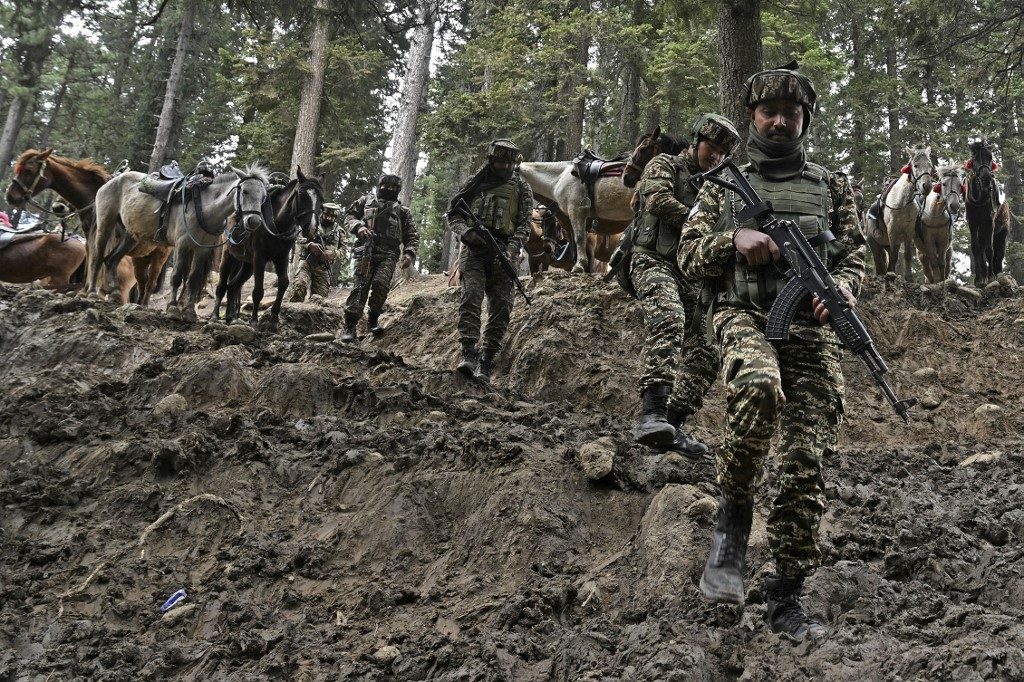
 ONCE again, the picturesque valley of Kashmir has been thrown into disarray, with both India and Paki- stan seemingly on pathways to war. In some circles, talk of war has already begun to echo like thunder across social media platforms and newsrooms.
ONCE again, the picturesque valley of Kashmir has been thrown into disarray, with both India and Paki- stan seemingly on pathways to war. In some circles, talk of war has already begun to echo like thunder across social media platforms and newsrooms.
The brutal killing of more than two dozen people in Pahalgam in Indian-held Kashmir on April 22 was a deep blow to the region. It was heartbreaking to see such unconscionable killings. The way the terrorists went about killing tourists, who were enjoying the serenity of the Baisaran Valley and its surrounding areas, was deeply disturbing.
But that has been the Kashmir story. For nearly eight decades, since the British exit from the subcontinent, the region has been at the heart of a bitter dispute between its two nuclear-armed neighbours. Divided by a Line of Control and decades of mistrust, Kashmir continues to bear the brunt of unresolved conflict.
In recent days, WhatsApp groups, Facebook threads and online forums have become battlegrounds of opinion. Messages supporting one side or the other flood these spaces, often blurring the line between patriotism and propaganda. Some posts read more like psychological warfare material than rational discourse. Others are part of what could be called the “let’s go to war” fan club — eager for confrontation, blind to consequence.
In one group, a retired government official forwarded a message claiming that the Pakistan leader has been admitted to military hospital. To make it look legitimate, it was accompanied by two letters, signed and stamped.
A quick fact check showed that a major Pakistan outlet had debunked the stor y. This should have been an immediate red flag. Not necessarily conclusive, but enough to prompt for further verification if you are keen to burn the forward button. Yet, it was shared with conviction.
What prompted the forward? When queried, the sender said he was reminded as to how our local leaders always end up in hospital when facing major crises or tribulations. The most recent incident that comes to mind is a former prime minister (PM) ending up in hospital as news broke out that the anti-graft body was investigating him for alleged corruption. This kind of logic — emotional rather than factual — is precisely why misinformation spreads so easily.
Let us remember: The first casualty of any war is truth.
Winning the hearts and minds of the people is as important as winning the war itself. In the process, propaganda machines are revved up, and social media users unwittingly become foot soldiers. So, when you receive your next Kashmir message, read it critically and question its veracity.
Next, the media frenzy. Be warned!
Within days of the attack, parts of the Indian media were replete with war-mongering type of programming.
A week after the Pahalgam attack, some news anchors were asking why it was taking so long for India to strike back. Never mind for the lack of proof of who actually undertook the dastardly attack. They want to see action! Retired generals were brought on air, urging action and fuelling nationalistic fer vour.
This time around, the Pakistan media — they can be equally hawkish when they want to — were more restrained. “If India says Pakistan is behind the attack, let them show the world,” was the refrain.
So, is war imminent? A news anchor asked a Pakistan former national security advisor. He replied: “The ease with which you and your media and your officials are talking about war in a nuclear environment in itself shows that there is a serious problem with the collective consciousness in India right now.”
Needless to say, leaders on both sides of the political divide are milking the event for their own political advantages. No doubts there. The Indian side has always used such incidents to shore up their reputation. On the Pakistan side, the military has historically used Kashmir as a chip.
At the time of writing, both sides have shown military restraint. If India strikes, Pakistan will respond. That’s a no brainer, a Pakistani analyst said in a talk show. There is simply too much pride on both sides to let it slide.
So, who’s going to blink first?
For final thoughts, I leave you with the words of Pakistan journalist Ishaal Zehra. In her article “Kashmir: Why was India so quick to blame Pakistan?”, she wrote: “The events in Pahalgam were tragic — but allowing tragedy to fuel misdirected aggression risks deepening instability. The stakes in South Asia are too high to entertain one-sided narratives.
“We must reject selective outrage, challenge unilateral claims and resist the reduction of complex tragedies into geopolitical scorecards. New Delhi must recognise that silencing Kashmiri voices and externalising blame do not equate to national security.”
Just like India, Pakistan, too, has a role. It takes two to tango.
- Habhajan Singh is the corporate editor of The Malaysian Reserve.
- This article first appeared in The Malaysian Reserve weekly print edition
The post Kashmir tragedy and the war rhetoric appeared first on The Malaysian Reserve.
